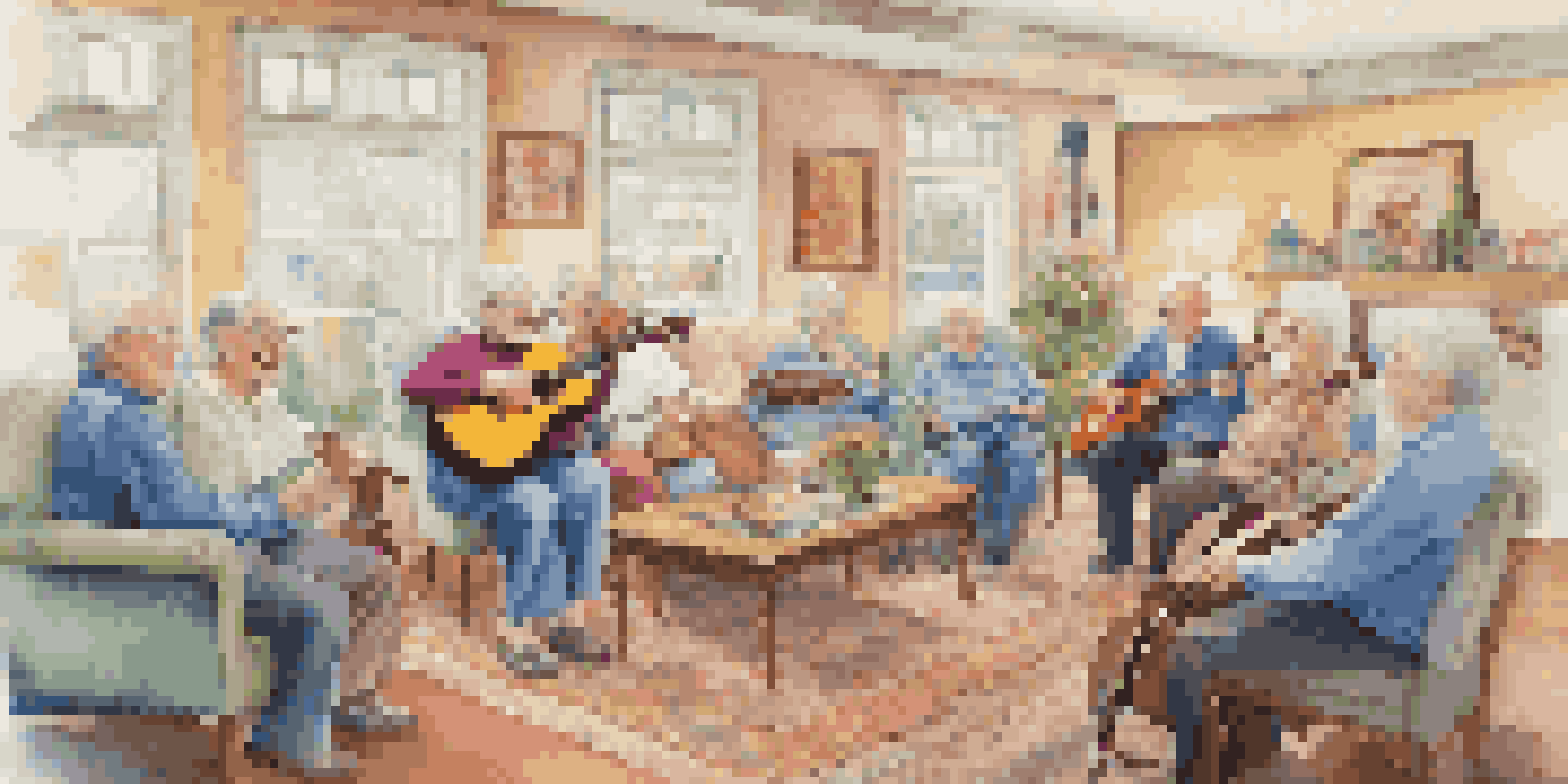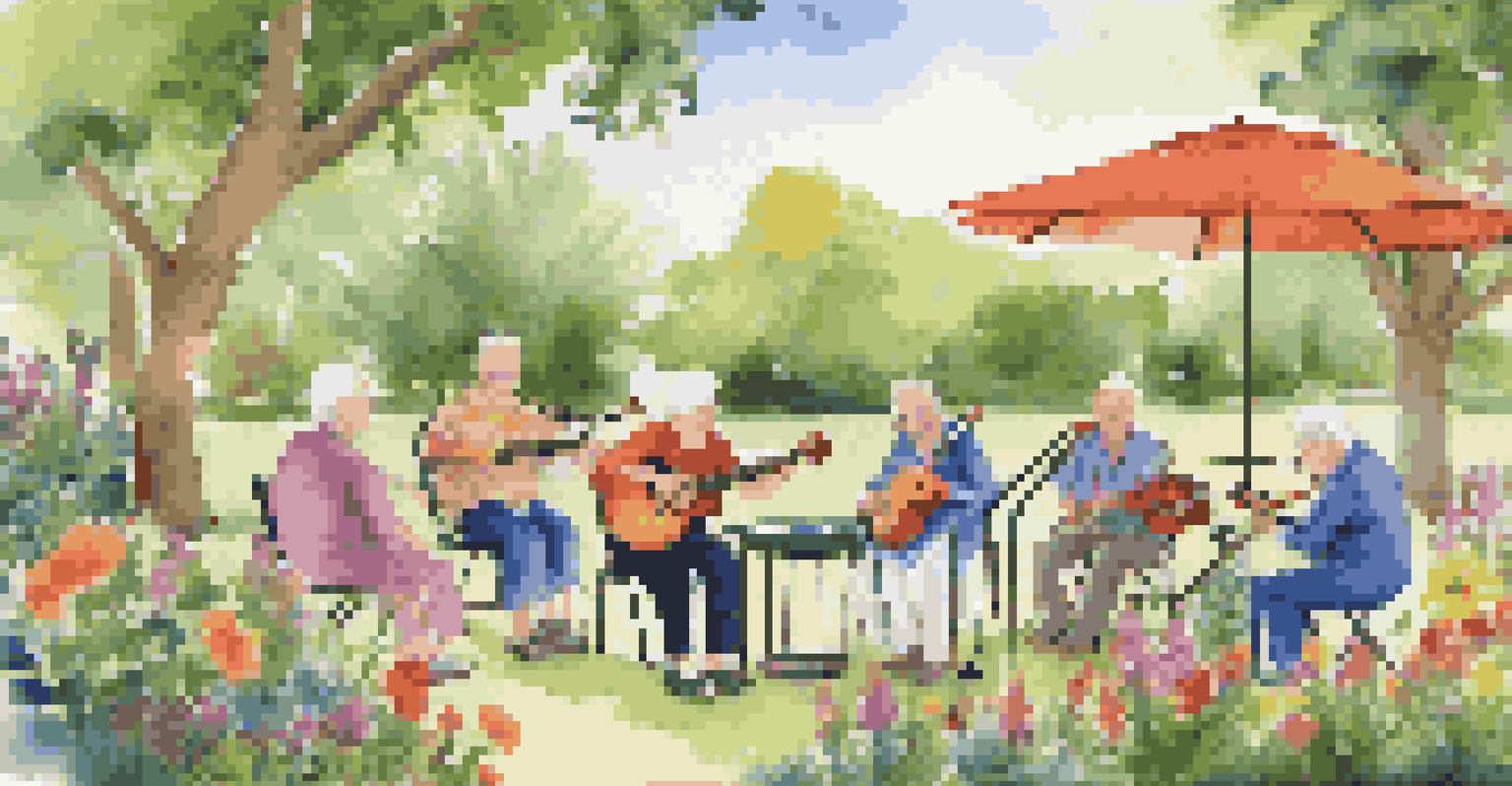Creating Music-Based Interventions for Seniors' Wellness

Understanding the Importance of Music for Seniors' Wellness
Music has a profound impact on our emotions and memories, making it a powerful tool for enhancing seniors' wellness. As we age, many individuals experience cognitive decline and emotional challenges, and music can help bridge those gaps. Engaging with music can stimulate brain activity, evoke positive memories, and even foster social connections, all of which are crucial for maintaining mental health in seniors.
Music can change the world because it can change people.
Research indicates that music can reduce feelings of loneliness and depression among older adults. For instance, group music activities promote social interaction, allowing seniors to bond over shared experiences and songs. This sense of community can bolster emotional well-being and create a supportive environment, which is essential for seniors who may feel isolated.
Additionally, music-based interventions can aid in physical rehabilitation. When combined with movement, music encourages seniors to engage in physical activities, improving their mobility and coordination. This holistic approach to wellness not only addresses mental health but also promotes physical vitality, making it a versatile tool in senior care.
Types of Music-Based Interventions for Seniors
There are various types of music-based interventions tailored for seniors, each designed to address specific needs. One popular method is music therapy, which involves a trained therapist using music to help seniors express themselves and cope with various challenges. This can include everything from singing and songwriting to listening and discussing music, creating a therapeutic outlet for emotions.

Another effective intervention is group singing or choir participation. These activities not only promote vocal expression but also foster camaraderie among participants. Singing together can ignite joy and reduce stress, creating an uplifting atmosphere that encourages seniors to connect with one another.
Music Enhances Seniors' Wellness
Engaging with music can stimulate brain activity, evoke positive memories, and foster social connections, crucial for maintaining mental health in seniors.
Lastly, personalized playlists or music listening sessions can have a remarkable impact on seniors' moods and cognitive function. By curating playlists that resonate with their past experiences, caregivers can evoke nostalgia and positive emotions, creating a comforting environment that enhances overall well-being.
Implementing Music Programs in Senior Care Settings
Implementing music programs in senior care settings requires thoughtful planning and consideration of the residents' preferences. Start by assessing the musical tastes of the seniors to ensure the selected music is relatable and enjoyable. This could involve surveys, informal discussions, or even one-on-one conversations to gather insights into their favorite genres and artists.
Where words fail, music speaks.
Once you have a clear understanding of their preferences, consider scheduling regular music sessions that incorporate various activities such as listening, singing, or even playing instruments. Consistency is key; regular engagement with music fosters a sense of routine and belonging among seniors. Additionally, inviting family members to participate can enrich the experience, allowing for shared moments and memories.
Moreover, creating a welcoming and comfortable environment is essential for these music programs. Ensure that the space is conducive to both relaxation and interaction, with comfortable seating and minimal distractions. A well-prepared environment can significantly enhance the effectiveness of music-based interventions, making it easier for seniors to engage and participate.
Measuring the Impact of Music Interventions
Measuring the impact of music interventions on seniors' wellness is critical for assessing their effectiveness. Start by establishing clear objectives, whether it's improving mood, enhancing social interaction, or boosting cognitive skills. Regularly tracking these goals can provide valuable insights into the benefits of the program and areas for improvement.
One effective method is to use surveys or questionnaires to gather feedback from participants. Questions can range from how the music makes them feel to whether they are more inclined to engage with others after a session. Additionally, observing behavior changes, such as increased participation in activities or improved mood, can offer qualitative data on the program's success.
Effective Music Interventions
Music therapy, group singing, and personalized playlists are tailored interventions that can significantly improve emotional well-being and social interaction among seniors.
It's also beneficial to involve healthcare professionals, such as therapists or social workers, in the evaluation process. Their expertise can help interpret the data gathered and provide a more comprehensive understanding of the music interventions' impact on seniors' overall wellness.
Challenges in Music-Based Interventions for Seniors
While music-based interventions can be immensely beneficial, there are challenges to consider when implementing them for seniors. One major obstacle can be the varying degrees of mobility and cognitive abilities among participants. Some seniors may have difficulty engaging with music due to physical limitations or cognitive decline, requiring tailored approaches to accommodate their needs.
Another challenge is the potential resistance from seniors who may not initially see the value in music activities. It's essential to foster a positive attitude toward participation by creating a welcoming environment and demonstrating the benefits of music. Gradually introducing music into their daily routines can help ease any apprehension and encourage more open-mindedness.
Finally, logistical issues such as funding and resource availability can pose challenges for implementing music programs. Care facilities may need to seek partnerships with local musicians or music therapists, as well as explore grants and community resources to support these initiatives. Overcoming these hurdles can ultimately lead to a more enriching experience for seniors.
Success Stories of Music-Based Interventions
There are numerous success stories showcasing the positive impact of music-based interventions on seniors' wellness. For example, a local nursing home implemented a weekly sing-along session that quickly became a favorite among residents. Many participants reported feeling happier and more connected to their peers, highlighting the power of music to foster community and joy.
In another inspiring case, a hospital introduced music therapy for patients with dementia. The music therapist utilized familiar songs from their younger years, leading to remarkable improvements in mood and engagement. Family members noted significant changes, including increased communication and emotional expression, demonstrating how music can unlock memories and enhance quality of life.
Measuring Music's Impact
Regularly assessing the effects of music interventions through surveys and observations can provide valuable insights into their benefits for seniors' overall wellness.
These success stories not only highlight the effectiveness of music interventions but also inspire others to explore similar programs. They remind us that music can be a universal language, bridging gaps and creating connections among people of all ages, especially seniors.
Future Directions for Music-Based Interventions
As we look to the future, the potential for music-based interventions in senior wellness is vast and promising. Advances in technology, such as music apps and virtual reality experiences, can provide innovative ways to engage seniors with music. These tools can enhance accessibility and personalization, allowing seniors to explore music in ways that resonate with their individual preferences.
Moreover, integrating music interventions with other therapeutic practices, such as art or movement therapies, can create holistic programs that address multiple aspects of wellness. This interdisciplinary approach can offer seniors a more comprehensive support system, catering to their emotional, cognitive, and physical needs.

Finally, ongoing research into the benefits of music in senior care will continue to shed light on effective practices and strategies. By remaining open to new ideas and methodologies, we can ensure that music-based interventions evolve alongside the changing needs of our senior populations, ultimately enriching their lives.